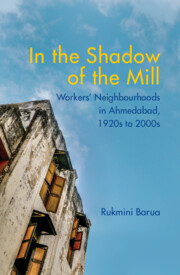2 - The Tla and Dadagiri: Mediation in the Mill Neighbourhoods
Published online by Cambridge University Press: 15 June 2022
Summary
Present-day mill neighbourhoods in Ahmedabad still retain traces of their previous incarnations. The vast emptiness of the former textile mill compounds is a material reminder of the city's earlier prominence as an industrial centre rivalling Bombay. Contemporary styles of everyday political functioning similarly owe their origins to the historic position of these localities as sites of prosperous industrial activity and as spaces of vibrant working-class politics. A close reading of the local politics of the mill neighbourhoods of Ahmedabad reveals the layers of mediation that existed between the dominant trade union, the TLA, the Congress Party and the city municipality. It offers us crucial insights into the textures of worker politics in an industrial city and leads us towards a more complex understanding of the multi-scalar dynamics of local political practices.
I discuss two figures of local importance, both considerably invested in matters of everyday political mediation—the union representative (the pratinidhi) and the local strongman (or dadas, as they were colloquially referred to)—and focus particular attention on the ways in which their power was constituted and on the points of intersection between their seemingly discrete realms. These two figures—the morally upright TLA pratinidhi constructed, for all discursive purposes, in the image of the model worker and the dada, the ‘anti-social element’, operating on the fringes of respectable society—appeared to inhabit two very different worlds. Literally meaning ‘elder brother’, the term dada is often used to signify a neighbourhood tough. In Ahmedabad, as elsewhere, they carry a reputation of being mathabhari, which, roughly translated, means hot-headed and dangerous. In more concrete terms, a mathabhari person would be defiant of established structures of authority and would have a penchant for violence while being able to extend a hand of patronage and protection in their domain of influence. Yet, as this chapter will show, the worlds of the dada and the pratinidhi coincided and converged at various points and it was through these intersections that the power of both of these political intermediaries was constituted during the period under study.
Though the dada has been widely represented in popular culture, a staple of Hindi cinema, there has been limited scholarly inquiry into this figure.
- Type
- Chapter
- Information
- In the Shadow of the MillWorkers' Neighbourhoods in Ahmedabad, 1920s to 2000s, pp. 70 - 95Publisher: Cambridge University PressPrint publication year: 2022

